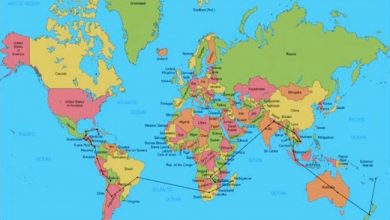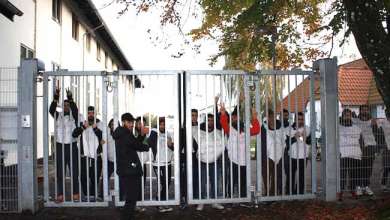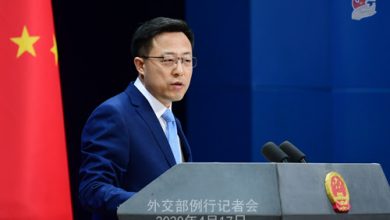Foreign Ministry Spokesperson Zhao Lijian’s Remarks on Yang Jiechi’s Meeting with US Secretary of State Michael R. Pompeo

Q: Did Director Yang Jiechi and US Secretary of State Mike Pompeo touch upon recent prominent issues in bilateral relations, such as those related to Taiwan and Hong Kong?
Zhao Lijian: During their meeting, Yang Jiechi expounded China’s basic attitude towards developing China-US relations and its positions on important and sensitive issues concerning Taiwan, Hong Kong and Xinjiang.
Yang Jiechi pointed out that China and the United States benefit from cooperation and suffer from confrontation. Cooperation is the only correct choice for both sides. China is committed to working with the United States to develop a relationship featuring non-conflict, non-confrontation, mutual respect and win-win cooperation, while firmly safeguarding its sovereignty, security and development interests. It is hoped that the US side will work with China to earnestly implement the important consensus reached by the two heads of state and bring bilateral relations back to the track of coordination, cooperation and stability.
On the Taiwan issue, Yang Jiechi stressed that there is only one China in the world and Taiwan is an inalienable part of China. The One-China principle is the political foundation of China-US relations. China is resolutely determined to safeguard its core interests. China demands the US side to earnestly abide by the One-China principle and the three joint communiqués and prudently and properly handle Taiwan-related issues.
On issues regarding Hong Kong, Yang Jiechi pointed out that Hong Kong affairs including the establishment of a legal system and enforcement mechanisms to uphold national security in Hong Kong are purely China’s internal affairs. China is resolutely determined in advancing the national security legislation. We firmly oppose US interference in Hong Kong affairs and the G7 Foreign Ministers’ Statement on Hong Kong. China urges the US side to respect China’s sovereignty, view the legislation objectively and fairly, and stop meddling in Hong Kong’s internal affairs in any form.
On issues regarding Xinjiang, Yang Jiechi stressed that thanks to the counter-terrorism and de-radicalization measures taken by the Chinese government in accordance with law, the security situation in Xinjiang has been turned around and the rights to life, health and development of all ethnic groups there have been effectively safeguarded. China strongly deplores the US signing into law of the “Uyghur Human Rights Policy Act of 2020”. We urge the US side to respect China’s counter-terrorism and de-radicalization efforts, stop applying double standards on counter-terrorism issues, and stop using Xinjiang-related issues as a pretext to interfere in China’s internal affairs.
Reuters: Regarding the China-India face-off, China and India agreed to resolve the issue through talks during the weekend before the last. Why are we still seeing an escalation of the situation? Who is now in charge of the talks to control the situation, the foreign ministries or the military departments?
Zhao Lijian: On your first question, in order to ease the situation in the border areas, China and India have been in close communication through diplomatic and military channels. On June 6, border troops of the two sides had a commander-level meeting where important consensus was reached to lower tensions on the ground. However, shockingly, on June 15, the Indian troops seriously departed from such consensus, crossed the LAC for illegal activities, and provoked and attacked Chinese personnel, which caused violent physical clashes between the two sides that led to casualties. The Chinese side has made strong protests and stern representations with the Indian side, demanding it to earnestly abide by the relevant consensus, strictly restrain its front-line troops, immediately stop all infringing and provocative actions, and refrain from any unilateral actions that will further complicate the situation. China and India have agreed to keep on the track of dialogue and consultation to resolve the relevant issue and work to alleviate the situation on the ground and uphold peace and tranquility in the border areas.
On your second question, China and India are in close communication through diplomatic and military channels.
Shenzhen TV: Australian Foreign Minister Marise Payne said on June 16 that “some countries are using the pandemic to undermine liberal democracy to promote their own more authoritarian models”. She underlined that the European Commission issued a report which revealed that Russia and China had carried out “targeted disinformation campaigns” and that “Twitter disclosed over 32,000 accounts as state-linked information operations, which the company attributed to Russia to China and to Turkey”. Payne said Australia will continue to counter the “infodemic” “through facts and transparency, underpinned by liberal democratic values that we will continue to promote”. I wonder if China has a comment?
Zhao Lijian: I already stated China’s principled position on Twitter’s closure of Chinese accounts. Guided by the people-centered philosophy of putting life first, China fought to win an all-out war against COVID-19. We also strengthened international cooperation following the vision of a community with a shared future for mankind. Our efforts and contribution have been commended by the Chinese people and the vast majority of the international community. Never have we sought to improve our image by waging disinformation campaigns, and there is no need to do so. I want to point out that as revealed in a recent report by The Australia Institute, the conspiracy theory that the coronavirus is a biological weapon artificially made by the Chinese government was spread through the “coordinated” efforts of clusters of US-controlled bots. This is the very definition of disinformation. Why is the Australian foreign minister turning a blind eye to it? As facts have shown, disinformation is Australia’s expertise, not China’s.
I would like to reiterate that disinformation, like the coronavirus, is a common enemy to all mankind. The UN and WHO have called on countries to strengthen solidarity and cooperation to counter all sorts of disinformation. We hope the Australian official will act in a responsible, just and objective manner, stop political manipulation of the pandemic and contribute to the global combat against the pandemic.
The Paper: Marise Payne also accused China of contributing to a climate of “fear and division” over the coronavirus. He also labeled Beijing’s warnings to citizens against travelling to Australia as “disinformation”. Payne acknowledged Australia may have made itself a target by speaking out for a review on coronavirus, but said it had been in Australia’s best long-term interests. What’s your comment?
Zhao Lijian: The issuance of travel advisory and an alert fo Chinese students going to study in Australia, based on a host of facts, is part of the Chinese government’s responsibility and obligation to safeguard the lawful rights and interests of its citizens including students. We are talking about the plain fact of existing discrimination and violence in Australia, but this Australian official labeled it as “disinformation”. Then may I ask, what about the rights, interests and feelings of those victims? Once again I would like to urge certain individual on the Australian side to heed the voice of the victims, face up to the problems and really think about what went wrong on their side.
Frankly, we don’t think it is “in Australia’s best long-term interests” when certain people, acting out of their own political interests, choose to turn away from facts and engage in politicizing the pandemic and sabotaging relevant international cooperation.
National Public Radio: Can the Chinese foreign ministry reveal any more details about what happened on the night of June 15?
Zhao Lijian: The Chinese People’s Liberation Army (PLA) Western Theater Command spokesperson already released a statement yesterday on what happened at the Galwan Valley area. It goes as follows:
Indian troops have broken their promises and again crossed the line of actual control in the Galwan Valley area on June 15 evening and purposely launched provocative attacks, leading to severe clashes that resulted in casualties. China always owns sovereignty over the Galwan Valley area, and the Indian border troops have acted in ways inconsistent with their words and seriously violated the agreements both countries reached and the consensus made during the army commander-level talks, and undermined the relations of the two militaries and the feelings of the two peoples. India should strictly restrain its front-line troops, immediately stop all infringing and provocative actions, meet the Chinese side halfway and come back to the right path of resolving differences through talks.
PTI: One, how is the situation on the ground now as China sees it, especially at the Galwan Valley where the problem has taken place? And my second question is, Galwan Valley is widely regarded as some area that has been settled between the two countries. Why suddenly this particular problem cropped up there? And now as you quoted, the PLA statement says China always owns sovereignty over the Galwan Valley, but it is widely regarded as a settled area between the two countries recently. Can you comment?
Zhao Lijian: Regarding Chinese and Indian troops on the ground, China and India are in close communication on the relevant matter through diplomatic and military channels. The overall situation in the border areas is stable and controllable.
On your second question, China and India are in close communication on the relevant issue through diplomatic and military channels. The right and wrong of this matter is very clear. It happened on the Chinese side of the LAC. The onus is not on China.
PTI: The Indian media reported on casualties on the Chinese side. Can you confirm?
Zhao Lijian: The border troops of the two sides are jointly dealing with the specifics on the ground. I have no information to release here.
I believe you have also noticed that since the incident happened, both sides have expressed willingness to resolve differences through dialogue and uphold peace and tranquility in the border areas.
As the two largest developing countries and emerging markets, China and India have far more common interests than differences. Both sides need to faithfully follow the important consensus reached between the two leaders to ensure that China-India relations will proceed along the right track in line with the interests and expectations of the two peoples. We hope that the Indian side will work with us and meet the Chinese side halfway.
PTI: Based on what you said now about the statements from both sides, can we presume or assume that there won’t be further clashes between the two sides at the border?
Zhao Lijian: For us, obviously we don’t want to see more clashes.
Bloomberg: Can you confirm reports in the media that US Secretary of State Pompeo and Director Yang Jiechi are meeting in Hawaii? Did China request the meeting? Also, what is the meeting about? Secondly, does China have a comment on the developments on the Korean Peninsula? Does it plan to be involved in the conflict that’s currently taking place?
Zhao Lijian: You must have skipped yesterday’s press conference. Please refer to my answers to similar questions yesterday.
RIA Novosti: Russian Defense Ministry announced that Chinese troops have already arrived in Moscow to participate in the military parade on June 25 to celebrate the 75th anniversary of the victory of the Great Patriotic War. I wonder if you could give more details on how many military personnel China has sent and who is the official that will represent the Chinese government at the parade?
Zhao Lijian: This year marks the 75th anniversary of the victory of World War II. As major victorious nations of WWII, China and Russia made important contributions to the victory. China supports Russia in holding celebration activities for the 75th anniversary of the victory of the Great Patriotic War. We will continue working with Russia and the rest of the international community to safeguard the fruits of WWII and the hard-won peace.
As for the specific question you asked about, I’d like to refer you to the Ministry of Defense.
AFP: What outcomes does China expect to see from the upcoming nuclear disarmament talks between Russia and the US?
Zhao Lijian: As we have repeatedly stated, it is our clear and consistent position that China has no intention to take part in a trilateral arms control negotiation with the US and Russia.
We have noted that the US keeps dragging China into the New START extension issue between the US and Russia. It is just the same old trick it plays whenever it seeks to shift responsibility to others.





